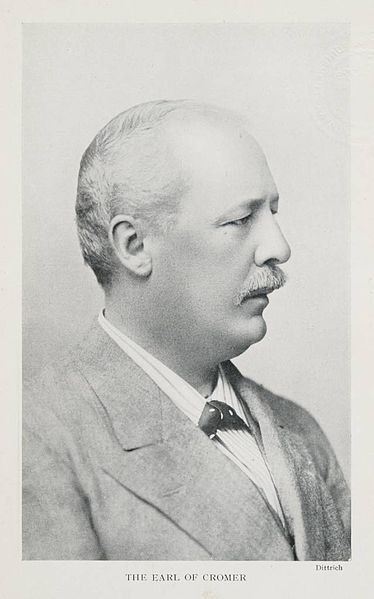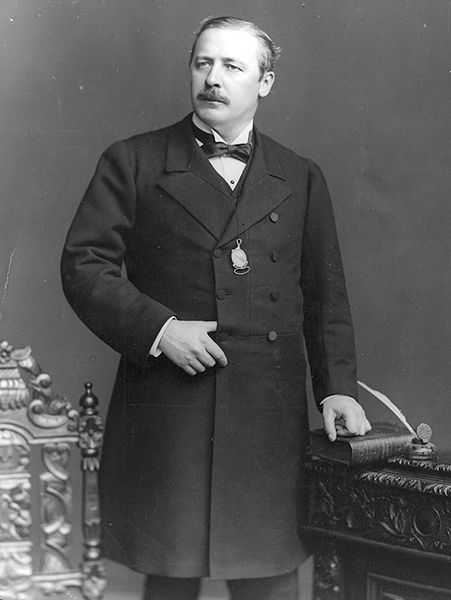<Back to Index>
- 1st Controller - General in Egypt Evelyn Baring, 1st Earl of Cromer, 1841
PAGE SPONSOR



Evelyn Baring, 1st Earl of Cromer (26 February 1841 - 29 January 1917), was a British statesman, diplomat and colonial administrator. He was British controller general in Egypt during 1879, part of the international Control which oversaw Egyptian finances after the khedives' mismanagement, and during the British occupation prompted by the Urabi revolt, agent and consul general in Egypt from 1883 to 1907. Far from the center of the Empire, Cromer ran the territory with great drive and his effective governance balked British wishes to withdraw from Egypt.
Baring was the ninth son of Henry Baring and his second wife, Cecilia Anne (Windham). The English Baring family descends from John (born Johan) Baring, who emigrated from Germany in 1717. John's son Sir Francis was the founder of Barings Bank. Henry was the third son of Sir Francis. When he died in 1848, 7 year old Evelyn was sent to boarding school. When he was 14, he entered the Royal Military Academy, graduating at 17 with a lieutenant's commission in the Royal Artillery. He was initially posted to a battery on the island of Corfu.
While on Corfu, Baring became aware of his own lack of education, and began a campaign of self education, learning Greek and fluent Italian. He also took a mistress, and fathered a daughter out of wedlock, Louisa Sophia. In 1862, he accepted a position as aide - de - camp to Sir Henry Storks, High Commissioner of the Ionian Islands. This position ended in 1864, with the union of Corfu to Greece. Later in 1864, Storks was appointed governor of Malta, again employing Baring as an aide - de - camp. The next year Baring accompanied Storks to Jamaica, where Storks headed the official inquiry into the Morant Bay rebellion. In 1868, Baring was selected to attend the Army's Staff College; he graduated in late 1869. He then worked for two years in the War Office, helping to implement post-Crimean War reforms.
Finding a military career not to his liking, Baring went to India in 1872 as private secretary to his cousin Lord Northbrook, Viceroy of India and quickly discovered that he had a knack for administration. With Northbrook's resignation in 1876, Baring returned to England. He received the C.S.I., and was promoted to major. Baring married Ethel Errington in 1876 and the following year resigned from the army.
During his stay in India, Baring came to believe that
local rule and autonomy were not the answer, and that only
the firm, direct guidance of a British colonial government
could bring order and prosperity. Later in Egypt, he
became further convinced that native rulers were
hopelessly corrupt and oppressive.
When Baring first arrived in Egypt in 1877, the country's finances were in shambles. Ismail Pasha, Khedive of Egypt, borrowed millions of pounds from European financiers for projects to build the Suez Canal, his personal use, and to cover persistent tax shortfalls. His finances depended on money obtained from Egypt's cotton industry, which flourished during the American Civil War. But after the war, as American cotton entered European markets once again, the price of cotton fell dramatically. As a result, Egypt's cotton was no longer the cash crop it used to be. Ismail Pasha found himself unable to even pay off the interest on his debts.
At first, Ismail attempted to call on his parliament to raise more tax money, but parliament resisted, as it consisted mostly of large landowners, who were lightly taxed. In desperation, Ismail turned to the European powers to help him out of his financial troubles. After some rocky negotiations the Dual Control system was instituted, whereby a French and a British controller were appointed to oversee Egypt's finances. Sir Evelyn Baring was appointed as the British Controller. Egyptian historian Al-Sayyid Marsot considers this desperate attempt on Ismail's part to obtain European help to have opened the floodgates for the British control of Egypt's finances, and eventual incorporation into their empire.
As the British Controller General, Baring was enormously
successful in serving British interests. He and his fellow
controller's de facto control of Egypt's finances
meant they wielded considerable influence in both the
Egyptian and British governments. Owning a large
proportion of Egypt's debt himself, when Ismail refused to
declare bankruptcy, Baring pressured his government to
depose Ismail, which they did in 1879. The general
population of Egypt widely blamed Ismail for the country's
financial struggles, and his removal was greeted with
relief. Ismail was succeeded by his son Tawfiq, who
cooperated with the European consuls.
The Urabi Revolt, led by Ahmed Urabi, a rising Egyptian colonel, endangered the Khedivate. After the subsequent intervention by the British in Alexandria (the 1882 Anglo - Egyptian War), Baring returned from India in Egypt as the British agent and consul general, "with a mandate for minor reforms and a prompt withdrawal of British troops". Baring's requests to withdraw were thwarted by British public outcry when the 1881 uprising of the Mahdi Muhammad Ahmad and the ensuing Mahdist War caused the successive defeats and deaths of the popular Colonel William Hicks and General Chinese Gordon.
Baring's first act as Consul General was to approve of the Dufferin Report, which essentially called for a puppet parliament with no power. In addition, the report asserted the need for British supervision of reforms deemed necessary for the country. Furthermore, it stated the interests of the Suez Canal zone should always be maintained. Baring believed that because of Egyptian administrative incompetence, a long occupation was essential to any sort of reform. Moreover, he established a new guiding principle for Egypt known as the Granville Doctrine (named for the Foreign Secretary, Lord Granville). The doctrine enabled Baring and other British officials to dismiss Egyptian ministers who refused to accept British directives. Under Baring, British officials were positioned in key ministries and a new system, known as the Veiled Protectorate, was introduced. Essentially, the government was a façade. Egyptian ministers were the outward form, yet British officials held the actual power. Baring thus remained the real ruler of Egypt until 1906, and this arrangement worked well for the first ten years of British control because Tawfiq Pasha was a weak man more than happy to abdicate any governmental responsibility. The Egyptian army, which Baring considered utterly untrustworthy due to its previous mutinies against the Khedive, was disbanded and a new army organized along with British lines (much like in India). With Egyptian finances stabilized by 1887, Baring also compelled the government in Cairo to abandon any pretension of reconquering the Sudan, which Egypt had lost control of following the Mahdist Rebellion. Careful (and often stingy) handling of the budget, plus promotion of irrigation projects, brought considerable economic prosperity to Egypt. Baring believed that at some point in the future, British control of Egypt would end and full independence would be restored, but only once the Egyptian people learned proper self governance.
Afaf Lutfi Sayyid - Marsot contends that under Baring, Egyptian nationalists were inert and many Egyptians believed in Britain's policy of "rescue and retire", but that Baring had no intention of doing so as, Marsot says, "Baring believed that 'subject races' were totally incapable of self government, that they did not really need or want self government, and that what they really needed was a 'full belly' policy which kept it quiescent and allowed the elite to make money and so cooperate with the occupying power."
In 1892, Tawfiq died and Abbas Hilmi II succeeded him. The young, ambitious khedive wanted to throw off British rule and to that end encouraged a nationalist movement, but he had not reckoned with Baring, who quickly bullied him into submission.
Baring was in August 1901 created Viscount Errington, of Hexham, in the County of Northumberland, and Earl of Cromer, in the County of Norfolk.
In 1906, Baring was made a Member of the Order of Merit by King Edward VII.
Baring was embroiled in controversy in both Egypt and
Britain in the wake of severe punishments meted out to
Egyptian peasants following the 1906 Denshawai Incident,
even though he was out of the country at the time and had
no direct involvement. The new Liberal government under
Prime Minister Sir Henry
Campbell - Bannerman decided to adopt a more
lenient policy towards Egypt, and Baring, sensing the end
was near, offered his resignation in April 1907. The
official reason given for his departure was health issues.
In July 1907, Parliament awarded him £50,000 in
recognition of his "eminent services" in Egypt.
Baring returned to Britain at the age of 66, and spent a year regaining his health. In 1908, he published, in two volumes, Modern Egypt (Vol 1 & Vol 2), a narrative of events in Egypt and the Sudan since 1876. In 1910, he published Ancient and Modern Imperialism, an influential comparison of the British and Roman Empires. In 1914, World War I broke out. The Khedive Abbas II supported the Ottomans, and was deposed by the British. This freed Baring to publish his impressions of the Khedive, Abbas II, in 1915.
A lover of the classics, Baring was very well read and spoke Greek, Latin, Italian, French and Turkish, but he never bothered to learn Arabic (the language of the lower classes in Egypt). During the opening years of the 20th century a nationalist movement began to appear in Egypt, but Baring, who became increasingly aloof with age, brushed it off as inconsequential.
In most regards, Baring was a typical Englishman of his generation. He believed with great conviction in the superiority of the Anglo - Saxon race and its duty to act as a parental figure to the less advanced peoples of the world. Viewing the Eastern mind as weak and "slipshod", he often boasted that he possessed an intimate understanding of it (despite evidence to the contrary). He very much fitted the stereotype of the British colonial administrator: fair, hardworking, devoted, and patriotic but humorless. Known to co-workers and intimates as "Vice - Viceroy" and "Over - Baring", he could be brusque and condescending to both his peers and the "subject races".
Baring was active in politics. Having been raised to the peerage as Lord Cromer in 1892, Baring was entitled to sit in the House of Lords. He joined the free trade wing of the Unionist party. Baring was a leader of the anti - suffragette cause, serving as the president of the Men's League for Opposing Woman Suffrage in 1908, then in 1910-12, the subsequent National League for Opposing Woman Suffrage. In 1916, he was appointed to the Dardanelles Commission, but it was too much strain for the 75-year old Baring to handle, and he died on 29 January 1917.
An English Heritage blue plaque commemorates Baring at 36 Wimpole Street in Marylebone.
His brother was Edward Baring, 1st Baron Revelstoke. Evelyn Baring, 1st Baron Howick of Glendale was his son.